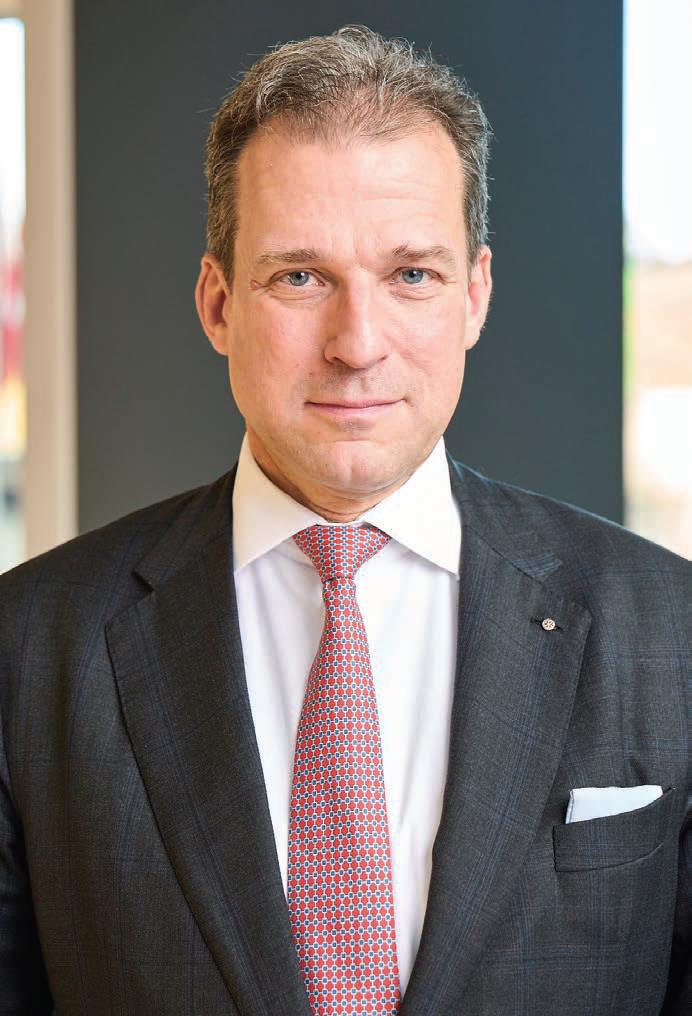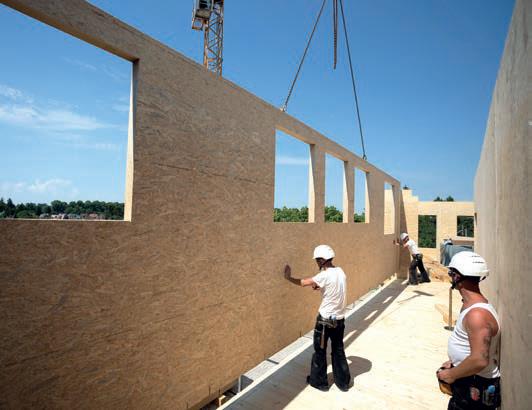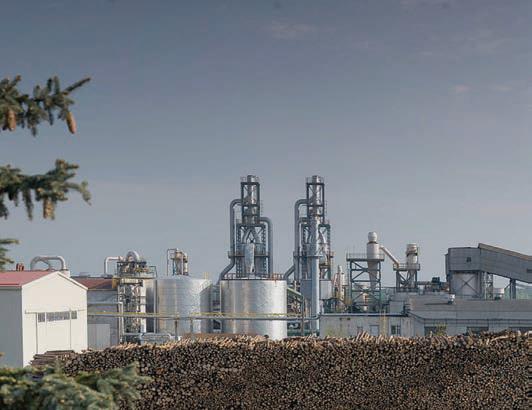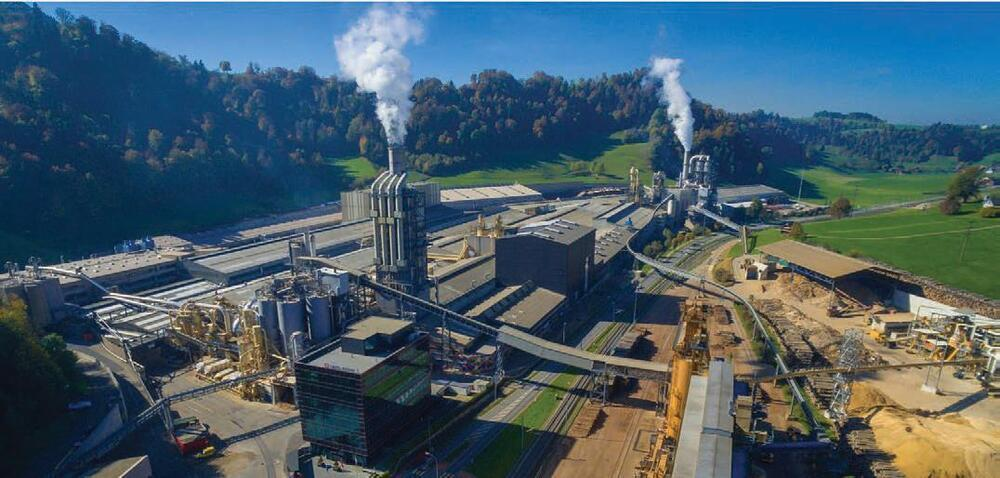Panels sector shows resilience
28 March 2023WBPI catches up with Swiss Krono CEO and European Panel Federation chairman Martin Brettenthaler to assess the current position of European wood-based panel markets and important issues affecting producers. Stephen Powney reports
Martin Brettenthaler wears two important hats in the European wood-based panels industry – that of chief executive officer and president of Swiss Krono and also as chairman of the European Panels Federation (EPF).
To say his schedule must be full is an understatement, particularly as his EPF chairmanship has coincided with the Covid pandemic, the war in Ukraine and the associated economic fluctuations and supply challenges that have affected the sector.
Add to that he has had to carefully steward Swiss Krono’s operations in Ukraine and Russia during wartime in eastern Europe.
Yet, despite these challenges, Mr Brettenthaler points to the resilience of the panels industry and retains an irrepressible optimism for the future health of the woodbased panels market and the potential of the products to help deliver on sustainability/ decarbonisation targets.
Swiss Krono has annual sales of approximately CHF2bn, has 5,000 employees and is based in Switzerland. In addition to the Ukrainian and Russian plants, it operates mills in Switzerland, Germany, Poland, Hungary, France and the US, producing OSB, MDF, particleboard and laminate flooring.
EUROPEAN PANEL MARKETS
When Mr Brettenthaler gave a keynote speech and summary of the market position of the European wood-based panel sector at the European Wood-Based Panels Symposium in Hamburg last October, the picture at the time was of a difficult market environment which was expected to persist through 2023.
So six months on how does Mr Brettenthaler assess the current state of health of the industry?
“Demand for wood-based panels in western Europe is considerably weaker than over the past years but there is a difference in the various segments,” he said.
“What I see from the Swiss Krono perspective and from the EPF, is that the downturn has been strongest when it comes to laminate flooring, which is clearly now suffering the worst effects (see p29). But also demand for OSB is down considerably. Only MFC furniture board and related products fare better.”
Laminate flooring’s downturn, he added, was the result of the high consumption of flooring during the DIY home makeover boom during the pandemic which has now ended.
The market environment for OSB, he added, was negatively impacted by strongly deteriorated financing conditions of private home builders when rising interest rates and price uncertainty for many building materials drastically reduced the financing possibilities.
He referenced the decision of large German housing contractor Vonovia in January not to commence new construction projects in 2023 as a sign of the jitters caused by the tougher economic environment.
In an interview with Westdeutsche Allgemeine Zeitung, Vonovia chief development officer Daniel Riedl said the company would wait “until capital is available again at acceptable interest rates or until a corresponding subsidy makes construction possible”.
Back to the OSB product specifically, Mr Brettenthaler said that January had been good for OSB business, but had since weakened.
“It could go either way, it could stay low or it could pick up in the spring.”
Mr Brettenthaler said the halt of Russian birch plywood exports into Europe should help increase sales of OSB, but there has not been a strong impact yet, due partly to existing high stocks of birch ply, which are now depleting.
For the large, traditional interior boards market – MDF and particleboard – demand has been more resilient and “surprisingly stable”.
The European furniture industry is reported to have experienced a strong reduction in orders, but demand for particle board and MFC has remained stable.
“But the lack of new builds at the moment will lead to decreased demand for kitchen cabinets in the coming months.”
Prices and margins for products have remain reassuringly quite stable.
The supply side has of course been a challenge for wood-based panel producers in recent times, be it on the raw material, chemicals or energy fronts.
“As far as I see it the wood-based panel producers have all reacted in the same way by reducing production,” Mr Brettenthaler explained.
“Nobody has really been building up stock or trying to be aggressive in cutting prices, but have adapted in the same way. It has been producing slower and optimising production.
“There is stabilisation on the chemical cost front, with PMDI – important for OSB – being more stable. There has been strong volatility in urea prices but it has reduced over the past month. Very high melamine prices have now come down a little bit but are still a lot higher than they were traditionally.”
For wood raw materials, Swiss Krono has seen strong price and cost increases, especially in Poland, but other markets are more stable.
“Before the Ukraine war, the general industry perspective was that roughly 10% of Polish roundwood consumption came from Belarus. This stopped, which has led to a knock-on effect to the west.”
THE ENERGY QUESTION
The question of energy – both pricing and availability – has been a hot potato for the sector, with Mr Brettenthaler and others warning governments and policy makers of the importance of affordable and available energy for operating panel plants.
Fears expressed last summer that some mills may not get enough energy to operate have thankfully not transpired.
“There is no shortage of energy in Europe which is good news,” he said.
“However, I think the problem is not solved. In my opinion, there are two different directions developing on a European policy level.
“I think those countries that have a clear policy on nuclear power have a clear strategy, a clear political will and plan. Then we have Germany where there is no plan.”
Mr Brettenthaler believes Germany’s big emphasis on green energy policies was a mistake which has not ensured energy security.
“Fortunately, there has been no stoppage of production in Europe because of a lack of energy supply,” he said. “There has been because of too high prices to make it profitable but there was no blackout or shutdown so far.”
High spot prices of gas last autumn, which caused great consternation did not end up leading to the problems forecast and gas prices fell back. But energy intensive MDF production has become more expensive than in the past.
“This leads, in my opinion, to the other worrying trend. There are areas of the world where the energy price is very different and those regions stand to benefit, such as the US and Turkey.
“There is still a risk of a tectonic shift [in wood-based panels production to other world regions] if energy prices remain high in Europe, as well as the other issues like high wood costs. Europe could lose competitiveness as a region,” he said. “That is a real risk.”
Swiss Krono, Mr Brettenthaler admitted, would be prepared to look at additional mill investment outside Europe as part of this trend to localised production where the economics are more favourable. Against this are freight costs, which remain costly and complicated.
REGULATION THREATS
Despite the wood-based panel sector having such a good environmental profile, regulators are causing complexities for producers. Though there have been calls to halt further regulations during the pandemic, the panels sector today faces new regulatory challenges that present very real risks.
“We are confronted with a multitude of new initiatives, which all have regulatory effects.
“A new topic is the focus on melamine, which is a key element of the board and surfaces. It is now in the process of being put on a list of substances with a high concern, even though there is really no proof of any mobility of melamine out of wood-based panels. This is a major issue and something that came out of nowhere. This really plays into the risk that Europe may lose ground to other regions of the world because this is a European approach only.”
This situation creates insecurity because the industry is unsure whether the outcome will be continued permitted use of melamine or a ban.
Mr Brettenthaler remains optimistic that wood-based panels can still come out “on the winning side” with regulators as the product has major potential to reduce carbon emissions in the built environment.
The EPF is lobbying in favour of the cascading use of wood principle in the face of the renewable energy directive, which seeks greater use of renewable energy including wood.
“Wood-based panels have a tremendous positive impact on decarbonising the building sector but also in providing longstanding jobs, which is not often taken into account.”
SWISS KRONO IN UKRAINE
Before the war began in Ukraine, Swiss Krono operated one plant in the east of the country and two in the west, producing OSB on a daylight press and MFC. Just before the invasion, it moved production from the eastern plant to the western facilities.
There was an initial stop in production when hostilities started, but the two plants have since run steadily. There are no current plans to restart the eastern plant as there is no demand or transport there.
Most of the production is sold domestically, with some volumes of MFC furniture board exported to Poland.
“The whole customer base is seriously resilient, as is our industry,” Mr Brettenthaler said.
“When the Kerch Bridge was attacked in Crimea, Russia attacked the energy structure of Ukraine and this is when we thought this could be the end for wood-based panels plants in Ukraine because of a shortage of electricity.
“Surprisingly, they figured it out and we have had very few days where we could not produce.”
Capacity utilisation in the plants is running at 80-90%.
As for Swiss Krono’s operations in Russia, the company still operates a large plant at Sharya with an MDF line and two particleboard lines, amounting to 1,200,000m3 in capacity. But it has ended its project for a new OSB facility there.
“This was a huge step because we had invested a significant amount of time, effort and money in the project. We have now resolved co-operatively the contracts with all suppliers. There was some equipment which we are using on other existing plants – in Hungary, Poland and France – and some we could hand back to the suppliers. In some cases, the suppliers have been able to find alternative customers for the equipment, like with the OSB press. It was a difficult exercise but we got through it.”
Swiss Krono has plans to invest in OSB capacities in western Europe but these are not advanced enough where it can publicly talk about them yet.
“From a Swiss Krono perspective, our intention to increase OSB capacity in the long term is unchanged but we can’t do it in Russia.
“Our strategy is with our existing OSB mills and we have started or already completed investments to increase capacities on existing lines. We target a capacity of 500,000-600,000m3 per line as being the optimum. We have worked really hard over recent years to get all our mills to this level. When this is concluded the only option would be building new plants.”
THE FUTURE
We asked Mr Brettenthaler, from his EPF leadership viewpoint, what his key message is to the European wood-based panels industry at this time.
“As an industry, I would say the general outlook for our products is unchanged in a positive sense. Besides the current short term challenges, Europe wants to confront the topic of fighting climate change and we know that building with wood is a key solution. Wood-based products are also renewable products.
“Secondly, we have a strong industry with strong players financially who are innovative and very diverse, so the industry can play an important role of keeping up the efforts of re-industrialisation in Europe in general.
“It’s also necessary that we as an industry stick together and fight the challenges and threats we face, be it regulation with regard to chemicals or the fight to safeguard the wood raw material. We need to make clear there needs to be a level playing field against other users of wood.
“If we can be successful in making our position heard then I think the future is very bright for wood-based panels.”



